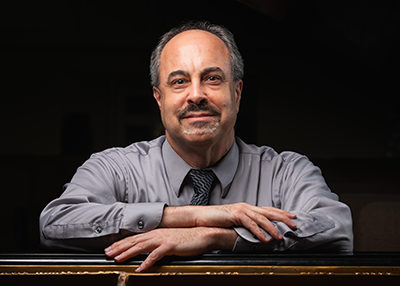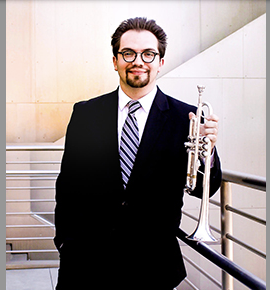by Kevin McLaughlin

On Saturday, April 5 at 4:30 pm in the Louis Stokes Wing Auditorium at the Cleveland Public Library, the Cleveland Silent Film Festival will continue their “CPL: Celebrating 100 Years” series with a screening of Alfred Hitchcock’s 1929 thriller Blackmail. Daniel Goldmark, Professor of Music at Case Western Reserve University, will introduce the film and the musical score. Admission is free.
The screening will also mark the debut of The Cleveland Photoplayers. Directed by pianist Eric Charnofsky (pictured), the ensemble includes violinist Emily Cornelius, cellist David Ellis, clarinetist Amitai Vardi, and cornetist Riley Conley.
“We’re going to be playing from a pre-selected collection of cues that I think suit the drama onscreen and are highly effective,” Charnofsky said during a recent interview.
He added that, fortunately, the Cleveland Silent Film Festival (CSFF) has secured the rights to use a compilation score for Blackmail as prepared by the Mont Alto Picture Orchestra, a nationally-known silent film orchestra based in Colorado. So much of the work of selecting and collating the music had already been done.
Still, Charnofsky needed to make decisions about how best to cover the instrumental parts — which were originally played by a large theater orchestra.
“A lot of editing of the parts was required, and I’ve had to decide which sections of the score to play myself and which to assign the other instruments. I’ve tried to avoid too much doubling with the piano,” Charnofsky said.
The pianist, a recent practitioner of silent film accompaniment, is enthusiastic about the screening of Blackmail. “This is my first go-around with this type of project and working with CSFF and the Cleveland Public Library,” Charnofsky said.“Playing piano and leading a small ensemble — while timing everything to the film and throwing in bits of improvisation — make this potentially the ultimate in musical and artistic collaboration. That’s the kind of experience worth getting excited about.”
In addition to working as a collaborative pianist and composer his entire career, Charnofsky’s theatrical experience has included playing piano and directing ensembles for opera, dance, and musical theater. He’s even written music for a student film.
“I imagine the main differences will be that a film is a fixed medium, so we have to adjust to it 100% of the time — but we won’t have to worry about drowning out singers! The ensemble can play at full volume as though it were a concert.”
Charnofsky said that it’s challenging to prepare music for a silent Hitchcock film because of audience expectations. “Hitchcock films from the post-silent era have benefited from some of the most iconic and brilliant musical scores, including those by Bernard Herrmann, Dmitri Tiomkin, and Franz Waxman. Having watched Blackmail a few times, I cannot imagine experiencing the film without music. But Hitchcock warrants music that is just as suspenseful, impassioned, and powerful as the moving images of the film.”
Some of Charnofsky’s early experiences with silent films were as a child, when he would go to a repertory cinema house that featured live music.
“The idea that the music itself would propel the aural experience meant that it was responsible for how the audience felt tension and relief, comedy and tragedy. It helped me focus more on the scores for modern films and how, even with dialogue and brilliant Foley artistry — sound effects — the music could be largely responsible for evoking what the audience senses.”

In order to achieve a more authentic sound, Conley said that he will be playing on a 1958 Olds Ambassador B-flat cornet, the instrument of choice during the early twentieth century.
Conley thinks that silent film is under-appreciated. “These films have the potential for timeless artistry and unique storytelling that will resonate with modern audiences. I’m excited to collaborate with the other musicians and aim to contribute taste and sensitivity. My only worry is how difficult the cornet part might be in context!”
Published on ClevelandClassical.com March 31, 2025
Click here for a printable copy of this article


